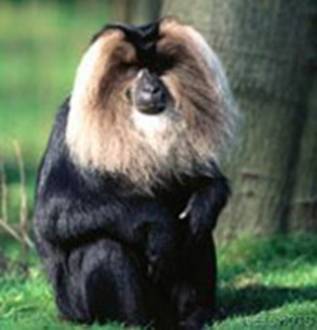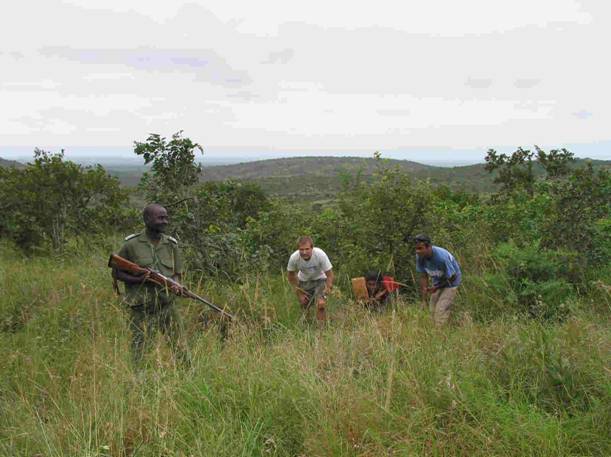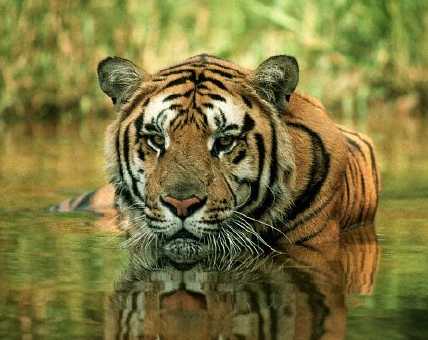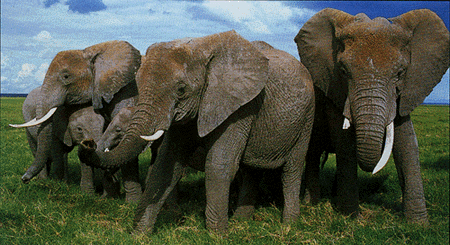|
Compiled by Rauf Ali
BITSians Running Wild
BITSians have been known to pursue
alternate careers. Movies,
music, art, journalism, politics, social work. But nothing is quite as
unusual as the career that a handful of BITSians have taken up, working
in forests with monkeys, crocodiles, elephants, tigers and more. What is
common to each of them is the passion for their work, and the
fulfillment of their careers. These are their stories.
 Rauf
Ali & The Liontailed Macaque
(72S04425) Rauf
Ali & The Liontailed Macaque
(72S04425)
A spur of the moment
decision took me to the BITSAA concert in
Bangalore
last July. Few memories remain
from the alcoholic haze most of us were in. Old friends whom I met
twenty-five years after graduation were surprised and amused to find that
one of their numbers was different. He was not either a manager or an
engineer. Well, actually was doing a very weird thing. I was a wildlife
biologist! Thinking about it, I came up with six more names, of people
from BITS who had opted for the same
career. I was able to contact four, and they responded. They have
told their stories in their own words, with varying degrees of effort, and
with the occasional annotation where I know something.
First, about myself.
I grew up in a family of zoologists, but never considered it a
career. Joined BITS in the
unassigned category, in those rare years when the experiment was tried.
Found a couple of Ph.D. types who were induced to come out of the closet
and go bird watching, usually in the thorn forests outside the campus. In
my second year, I decided I didnít want to be an engineer, and all this
molecular bio stuff was boring. Luckily B.Sc. was offered for the last
timeÖ.
I started working on the
highly endangered liontailed macaque in an area now known as the
Kalakad-Mundanthurai Tiger Reserve (as a Bombaywala let loose in rural
Tamil Nadu for the first time, you can imagine the problem with these
words!). I also did some work on bonnet monkeys at the same time and found
I had so much info on them that it made sense to write up my Ph.D.
dissertation on them. Which I did at
Bristol
in
England
, followed by research assistantships at the Smithsonian Institution and
then Harvard.
I then made the mistake of
coming back to
India
, and found myself the pawn in
a lot of political games. This is all university education in
India
seems to be about. Three universities later (
Madurai-
I resigned; IISc- I quit noisily;
Pondicherry-
I was sacked after abusing the Vice-Chancellor), and after having the
exalted status of Professor, I began working for NGOís. Iím now
trustee of one. In the meantime, Iíve worked on forestry economics,
protected area management, gibbon behaviour, birds, plants, and coral reef
socio-economics, besides hopefully helping
a number of young reprobates to get started (see below).
Most recently Iíve spent
the last couple of years in the
Andaman Islands
looking at various environmental problems there. I hope to start a
research programme there soon.
Rauf
Ali
rauf@feralindia.org
 Jayashree
Ratnam & The Crocodiles Jayashree
Ratnam & The Crocodiles
A dreary PS2 in a grey New
Delhi, a couple of hikes in the Garhwal Himalayas and a trip to Corbett
National park, and I had the epiphany of my life: being a computer
scientist was clearly not for me. I returned home to Chennai to reexamine
my choices, and decided to work towards joining the Masterís program at
the Salim Ali School of Ecology in
Pondicherry
. I passed the entrance exam,
but whether I would have made it through the interview had not Dr. Rauf
Ali, one of the interview panelists, chosen to do no more than merely
raise an enquiring eyebrow at my less-than-heavy CGPA, will always be a
question in my mind.
In what followed, I
graduated with a masterís under Raufís aegis, trained as a behavioral
ecologist. It was my good
fortune to wander the forests of southern
India
and the
Andaman islands
in search of birds and lizards during this time. ( Well, one type of
lizardÖa gecko actually. It was bright green and hung out on coconut
leaves-RA) This was followed
by a year of studying captive monitor lizards at the Madras Crocodile Bank
Trust in Mammallapuram (I Do recommend a visit - its denizens of
open-mouthed, apparently indifferent crocodiles and turtles in fact have a
fascinating evolutionary history and resilience).
From there to the cold northern climes of upstate
New York
for a PhD program at
Syracuse
University
, where I continued to train as a behavioral & evolutionary ecologist
and conservation biologist.
In a truly strange series of
coincidences, I ended up studying decision-making behavior in bonnet
macaques in the Mundanthurai Tiger Reserve in southern
India
for my dissertation; the coincidence being that I studied the same troop
of bonnets that Rauf had studied in 1976 for his PhD.
Indeed, we believe one of the females he had studied was still
alive, albeit very old at the time of my study 22 years later.
Her thoughts on the predilections of some graduates from Pilani for
staring curiously at her for hours, I am sad to report I donít know.
As of the current moment, I
am a research scientist at the Natural Resource Ecology Labs of Colorado
State University. I now study
patterns of herbivory and the morpho-physiological adaptations of trees in
the semi-arid and arid savannas of
Africa
. This is a necessary detour-
any biologist must needs see
Africa
- after all, it is the cradle- and an incredibly beautiful one.
I imagine I will eventually be back in the forests of southern
India
, hopefully to study and work in them for the rest of my life.
Jayashree
Ratnam
jratnam@nrel.colostate.edu
 Mahesh Sankaran & The Tigers Mahesh Sankaran & The Tigers
I boarded the bus for that
all too familiar trip from Pilani to ISBT for the last time in 1988.
M.Sc.(Tech) Computer Science is what the degree said.
I signed on the first dotted line proffered my way and plunged
headlong into the fiefdom of corporate overlords.(And also the world of
sleazy bars in Pondy where I got to know him and Jayu well-RA)
Two years and as many manic bosses later (most didnít like being
called fools to their faces, a disease all of us seem to have picked
up-RA), I was through with the corporate world.
A hop across the pond found me in the cotton-pickin' South,
pursuing a Master's degree in Wildlife Sciences at
Auburn University
,
Alabama
. Between prolonged periods spent at the local watering-hole, I worked on
developing spatially explicit models to predict extinction probabilities
and patterns of gene-flow in endangered small mammal populations.
From there it was on to the snowy expanses of upstate New York for
a Ph.D. at Syracuse University.
For my dissertation, I
worked at the Kalakad-Mundanthurai Tiger Reserve in south
India
, investigating the potential causes and consequences of recent herbivore
and predator declines in the reserve. (This is nonsense. He lit forest
fires and watched what happened to the plants afterwards-RA)
I am now a Research Scientist at the Natural Resource Ecology
Laboratory at Colorado State University, having spent a year in the
interim as a post-doctoral researcher at the Imperial College in London.
My research focuses on understanding how species extinctions within
communities influence their subsequent ability to function and recycle
water, nutrients and energy. I
will eventually return to work in the forests of the
Western Ghats
. In the meantime, I am
studying savanna-grassland ecosystems in
Africa
-
Kenya
and
South Africa
in particular.
Mahesh
Sankaran,
mahesh@nrel.colostate.edu
Madhu Rao & Logging
I had always wanted to be an
ecologist and as a keen outdoor person wanted to ensure I chose a career
where I spent most of my time in the wild. I completed the Bio.Sciences
degree at BITS as a start. I dropped computer science as a dual degree
much to everyone's horror. I was always quite keen to follow something
other than the usual professions and wildlife, nature and the like have
been a long-time favourite. So, I guess I am fortunate to be actually
making a living out of doing something I really enjoy and believe in. I
initially did a MS in Conservation Biology at
Duke
Univ.
researching orangutans and selective logging in
Indonesia
followed by a Ph.D. researching forest fragmentation in south eastern
Venezuela
. Following that I became assistant director of the WCS Asia Program based
out of
New York
designed and managed projects in about 12 Asian countries. I am currently
Associate Conservationist with WCS and working on projects in
Burma
and
South East Asia
. It has been a fun ride all the way and I cannot think of anything else
Iíd rather be doing.
Madhu Rao
mrao@wcs.org
Arun Venkatraman & Elephants
 What do wasps, Asiatic wild dogs and elephants have in common? Nothing
at all, apart from the wacky spectacle of a Wonky working on all these
diverse taxa through a series of events that were actually quite
connected. I was one of few
BITSIANs who steadfastly refused to do a dual degree, despite considerable
family and peer pressure, preferring to pass out with a M.Sc. Bio. degree.
Armed with superficial wisdom in everything from circuit theory to the
dynamics of social change (I perfected cracking make-ups there!) and
unable to compete with curricula trained Molecular Biologists, I opted to
do a Ph.D at the Centre for Ecological Sciences, IISc,
Bangalore
. I then spent 5 years watching social
wasps do everything from copulating to evicting colony queens! And did
produce a reasonably sound Ph.D at the end of this (fortunately visits by
my illustrious senior (Rauf) were far and few then, as it took days to
recover from them!). During the last year of my Ph.D, the call of the wild
hit hard abetted by a nascent group working on wildlife ecology at CES and
frequent trips with a hopelessly teutonic German primatologist. This call
has actually persisted through much of my life and while at BITS, resulted
in a trip to Sariska with a despondent group of batch-mates. Memories of
this trip include 7 of us spending a night in a hide with, what turned out
to be a deranged homosexual guide. My enthusiasm for wildlife fortuitously
did not dampen. What do wasps, Asiatic wild dogs and elephants have in common? Nothing
at all, apart from the wacky spectacle of a Wonky working on all these
diverse taxa through a series of events that were actually quite
connected. I was one of few
BITSIANs who steadfastly refused to do a dual degree, despite considerable
family and peer pressure, preferring to pass out with a M.Sc. Bio. degree.
Armed with superficial wisdom in everything from circuit theory to the
dynamics of social change (I perfected cracking make-ups there!) and
unable to compete with curricula trained Molecular Biologists, I opted to
do a Ph.D at the Centre for Ecological Sciences, IISc,
Bangalore
. I then spent 5 years watching social
wasps do everything from copulating to evicting colony queens! And did
produce a reasonably sound Ph.D at the end of this (fortunately visits by
my illustrious senior (Rauf) were far and few then, as it took days to
recover from them!). During the last year of my Ph.D, the call of the wild
hit hard abetted by a nascent group working on wildlife ecology at CES and
frequent trips with a hopelessly teutonic German primatologist. This call
has actually persisted through much of my life and while at BITS, resulted
in a trip to Sariska with a despondent group of batch-mates. Memories of
this trip include 7 of us spending a night in a hide with, what turned out
to be a deranged homosexual guide. My enthusiasm for wildlife fortuitously
did not dampen.
As
wild dogs or dholes are possibly the most social mammal known within the
country and offered immense challenges in their study and conservation, I
promptly declined all post-doc offers abroad and aided by a grant from the
government began working on these elusive animals for the next four years
in the Mudumalai Sanctuary , Tamil Nadu . So far this has been
scientifically the most rewarding and exciting period of my life. At the
end of this, family needs did prevail and I had to move back to
Bangalore
for my sonís education and my wifeís
apparent sanity (actually she now wants to go back to the wilds and is
diligently constructing our house outside Bandipur Tiger Reserve). Around
this time I was offered a position to direct scientific programmes at the
newly created Asian Elephant Research and Conservation Centre at CES,
Bangalore
and I was there till August, 2003. The job
was great and allowed much travel to elephants habitats in
India
,
Southeast Asia
and
Africa
.
The
halcyon days in
Bangalore
were however short-lived. I was selected
to head a new programme for
South Asia
under the Convention for International
Trade on Endangered Species called MIKE (Monitoring of Illegal Killing of
Elephants). I presently provide technical advice and build capacity for
the implementation of this programme by the Governmentís of
Bhutan
,
Bangladesh
,
India
,
Nepal
and
Sri Lanka
. I live in
New Delhi
that has been aptly described as a dark
and dreary place by a contributor to this feature . But thanks to
work-related travel frequently get out to sunnier climes.
Arun
Venkataraman
arunvenkataraman@citesmike.org
|

 Rauf
Ali & The Liontailed Macaque
(72S04425)
Rauf
Ali & The Liontailed Macaque
(72S04425) Jayashree
Ratnam & The Crocodiles
Jayashree
Ratnam & The Crocodiles Mahesh Sankaran & The Tigers
Mahesh Sankaran & The Tigers What do wasps, Asiatic wild dogs and elephants have in common? Nothing
at all, apart from the wacky spectacle of a Wonky working on all these
diverse taxa through a series of events that were actually quite
connected. I was one of few
BITSIANs who steadfastly refused to do a dual degree, despite considerable
family and peer pressure, preferring to pass out with a M.Sc. Bio. degree.
Armed with superficial wisdom in everything from circuit theory to the
dynamics of social change (I perfected cracking make-ups there!) and
unable to compete with curricula trained Molecular Biologists, I opted to
do a Ph.D at the Centre for Ecological Sciences, IISc,
What do wasps, Asiatic wild dogs and elephants have in common? Nothing
at all, apart from the wacky spectacle of a Wonky working on all these
diverse taxa through a series of events that were actually quite
connected. I was one of few
BITSIANs who steadfastly refused to do a dual degree, despite considerable
family and peer pressure, preferring to pass out with a M.Sc. Bio. degree.
Armed with superficial wisdom in everything from circuit theory to the
dynamics of social change (I perfected cracking make-ups there!) and
unable to compete with curricula trained Molecular Biologists, I opted to
do a Ph.D at the Centre for Ecological Sciences, IISc, 
